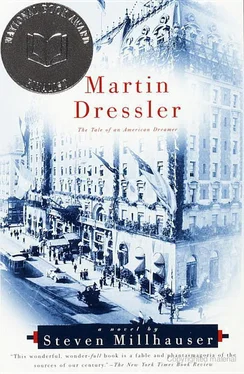And at once he saw: deep under the earth, in darkness impenetrable, an immense dynamo was humming. Above the dynamo was an underground hive of shops, with electric lights and steam heat, and above the shops an underground park or garden with what seemed to be a theater of some kind. Above the ground a great lobby stretched away: elevator doors opened and closed, people strode in and out, bells rang, the squeak of valises mingled with the rattle of many keys and the ringing of many telephones, alcove opened into alcove as far as the eye could see. Above the lobby rose two floors of public rooms and then the private rooms began, floor after floor of rooms, higher and higher, a vertical city, a white tower, a steel flower — and always elevators rising and falling, from the cloud-piercing top to the darkness where the great dynamo hummed. Martin had less the sense of observing the building than of inhabiting it at every point: he rose and fell in the many elevators, he strolled through the parlor of an upper room and walked in the underground park or garden — and then it was as if the structure were his own body, his head piercing the clouds, his feet buried deep in the earth, and in his blood the plunge and rise of elevators.
Martin’s eyes opened. He was sitting in the lobby of the old Vanderlyn Hotel. He was feeling a little tired, his heart was beating rapidly — and from his heart there beat, in wave after wave, a wild, sweet exhilaration.
“AND YET YOU’VE ALWAYS SAID YOU WEREN’T cut out for hotel life,” Emmeline said. “So it can’t be that, unless it was really that all along. But I don’t think so. You’d have stayed at the Vanderlyn in the first place.”
“Choking to death on the rope handed to me by Alexander Westerhoven? No thank you.”
“Anyway you’ve answered my question.”
“Which one was that?”
“You know: the one about what you’d do if you were ever rich. Now I know.”
“I’m not rich,” Martin said quickly, bending over his soup.
Nearly four weeks had passed since his vision in the lobby of the Vanderlyn, and the feeling of exhilaration, the sense of a sweet adventure, of a beckoning, was still with him. In a month that seemed both feverish and very calm, he had sold his chain of cafes lock, stock, and barrel to a real estate millionaire grown rich in West End land speculation, and without a moment’s hesitation he had purchased the Vanderlyn. Dundee had grasped his arm warmly at the news, his eyes stern with pleasure, but Emmeline had thrown him a stricken look. To give it all up, all of it, just like that! It was too sudden, too strange, too, well, impulsive and unsettling and confusing. At the very least he ought to incorporate and raise the money for his scheme by selling shares of stock. That way, if he decided — but Martin wouldn’t hear of it. He had gone off in a useful and profitable but finally boring direction and wanted no distractions. With the help of a quarter-million-dollar bank loan he planned to undertake a major renovation. Emmeline had resisted his plan that she leave the small world of the cafe to become the new food and beverage manager of the Vanderlyn; he had begged Dundee to speak to her. After a week of hesitation she had come round, though not without conditions of her own: she was willing to leave the cafe, but insisted on starting in a humbler position, perhaps as a kitchen helper. Martin countered by offering her the position of part-time day clerk and part-time secretarial assistant.
The morning after the purchase, Martin stepped into Mr. Westerhoven’s office, closed the door, and offered him the newly created position of consultant to the manager, at a handsome salary. To his surprise Mr. Westerhoven held up a hand to silence him, closed his eyes, and tendered a flowery resignation. He would not impede the stream of progress, not he; no no, not he; it was time to step aside, to make room for young blood, for the new generation. In the brown room, cluttered with bronze statuettes and shelves of knickknacks, it struck Martin that Mr. Westerhoven looked like a large, bewildered boy. His thin coppery hair was combed neatly to one side, his old-fashioned morning coat had a fresh white carnation in the buttonhole, but his gaze kept drifting about the room, and he had a new habit of tugging at an earlobe and pulling at the end of his nose.
The next morning Martin introduced to the front-office staff and to the chief members of housekeeping, engineering, food services, and accounting the youthful new manager, Mr. James Osborne, whom he had hired away from a small but fashionable uptown hotel that two years earlier had undergone a successful renovation which included the transformation of the top floor into artists’ studios. Martin had no plans to introduce artists’ studios into the Vanderlyn, but he wanted a man who, while understanding what was charming in a somewhat antiquated hotel, wasn’t afraid of change. Osborne, who was thirty-two, had an air of vigorous confidence that was only enhanced by the touch of gravity in his manner. He put Martin in mind of a successful young banker.
“Anyway,” Martin said, “it’s something I understand from the inside. And it’s fresh air — fresh air. I couldn’t breathe any more in the cafe business.”
“You talk a lot about that,” Emmeline said.
“About breathing?”
“About not being able to breathe.”
“Do I? That’s what it comes down to, I guess. Being able to breathe.”
“That sounds like an epigram, Martin. But we’d better get back to the lobby and check up on those carpenters.”
Martin, who counted on Emmeline’s advice, was throwing himself into every detail of the renovation. He planned with Osborne the strategy for closing off a block of rooms while keeping the hotel open, conducted the team of interior decorators through the entire building from basement to roof, and approved the replacement of steam engines by electric motors to drive the elevator drums. He visited furniture wholesalers with an eye to selecting beds and dressers, discussed with Dundee the wiring of the entire building for electricity, studied the plan for the installation of telephones, talked with the wood-finishers in the lobby who were repairing the carved window-moldings and the upholsterers in the basement who were recovering parlor chairs. He visited plumbing supply companies and examined porcelain bathtubs with brass fittings, polished brass tumbler-holders and cigar rests, copper-lined ash and cherry water-tanks with nickel-plated chain and pull. From years of listening to the complaints of hotel guests, Martin knew that the bathroom loomed large in the imagination of Americans. And it was precisely here, as he wandered among displays of veined marble sinks and brass towel racks, that he was struck again by a contradiction in the architecture of hotels, a contradiction that was nothing but the outward expression of a nation’s inner desire. For here the technologically modern and up-to-date clashed with a certain nostalgia of decor: bathrooms with ingenious American flush toilets and needle showers were given a suggestion of the European palace by decorations such as pilasters of Siena marble and shower hoods of carved mahogany. The modern luxury bathroom mirrored the modern hotel lobby, with its combination of electric lighting and old-fashioned carved ceilings, but it was also cousin to the modern department store, where terra-cotta scrollwork and grand marble stairways clashed with electric elevators and brand-new plate-glass windows that displayed the latest folding cameras with rack-and-pinion focusing movement, waterproof overcoats with patent ventilators, and self-threading sewing machines in drop cabinets. Far from deploring such contradictions, Martin felt deeply drawn to them, as if they permitted people to live in two worlds at once, a new world of steel and dynamos and an older world of stone arches and hand-carved wood.
Читать дальше












